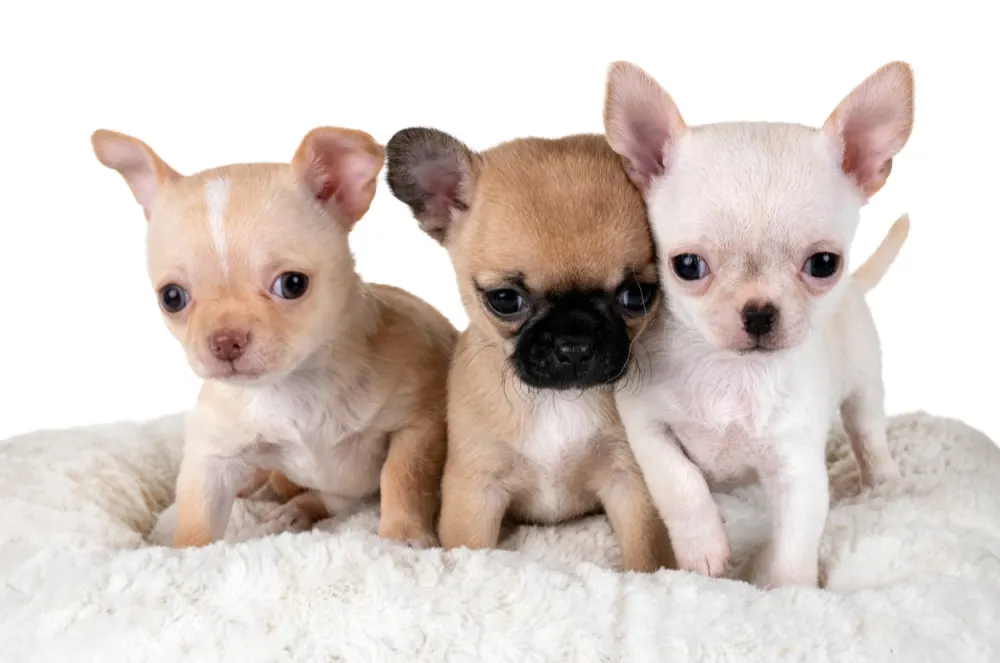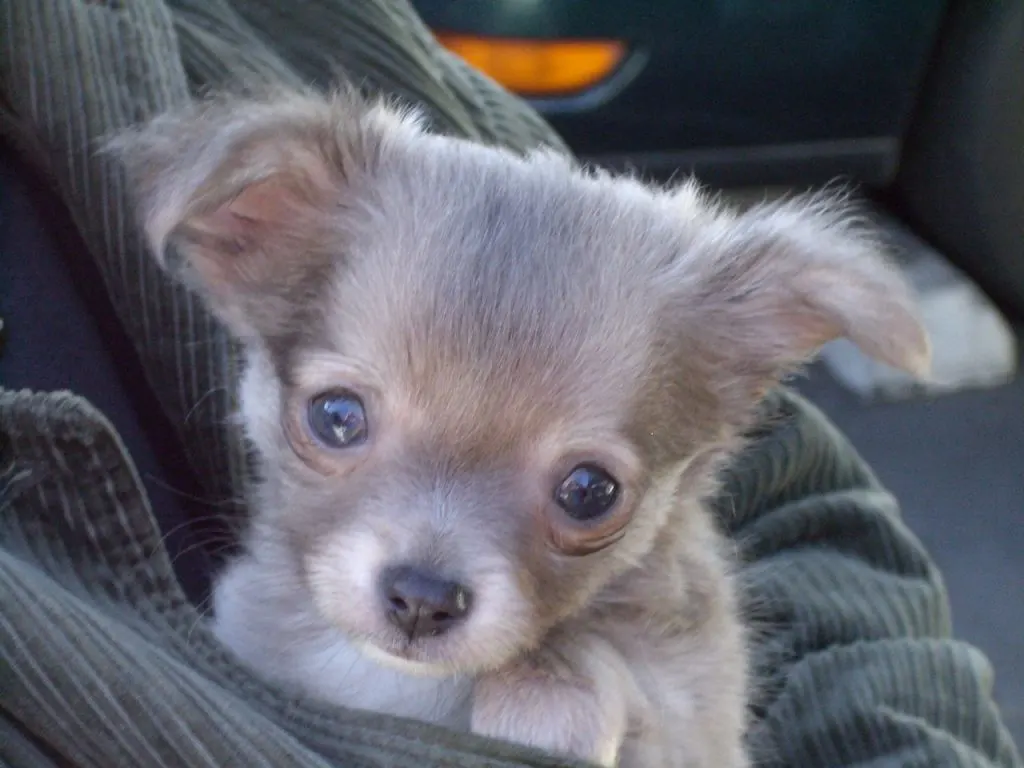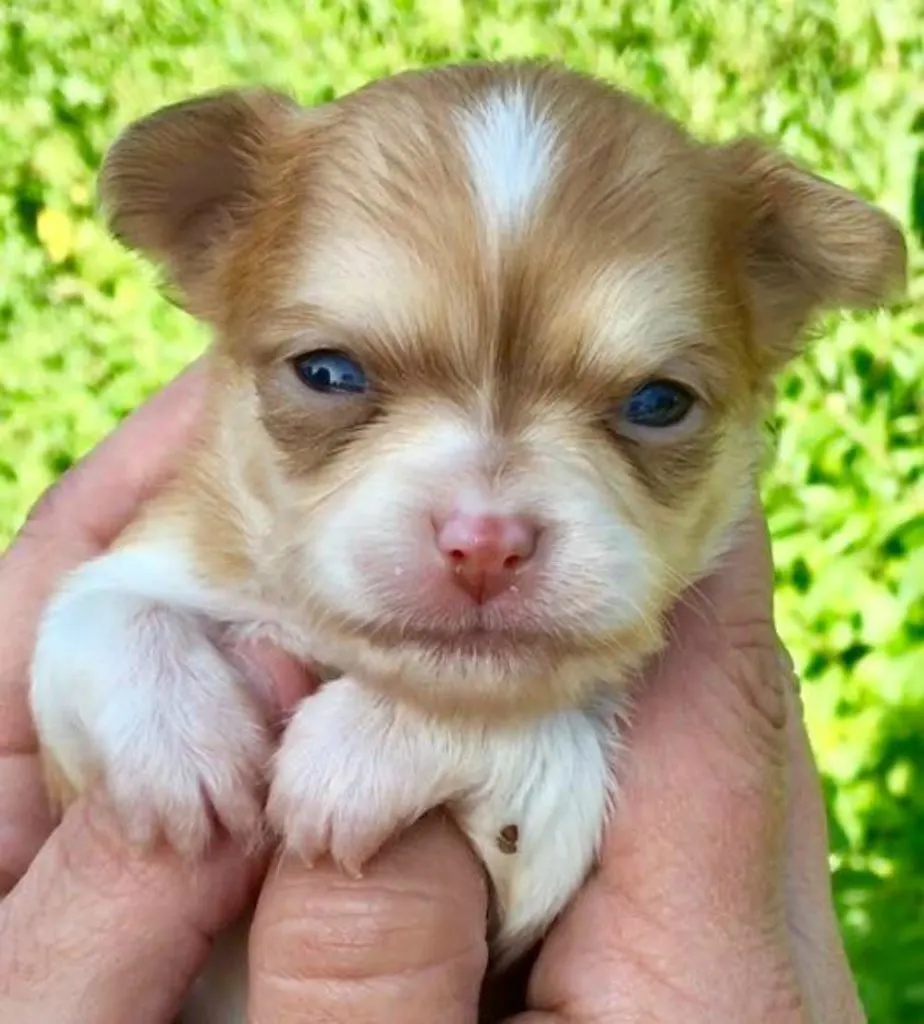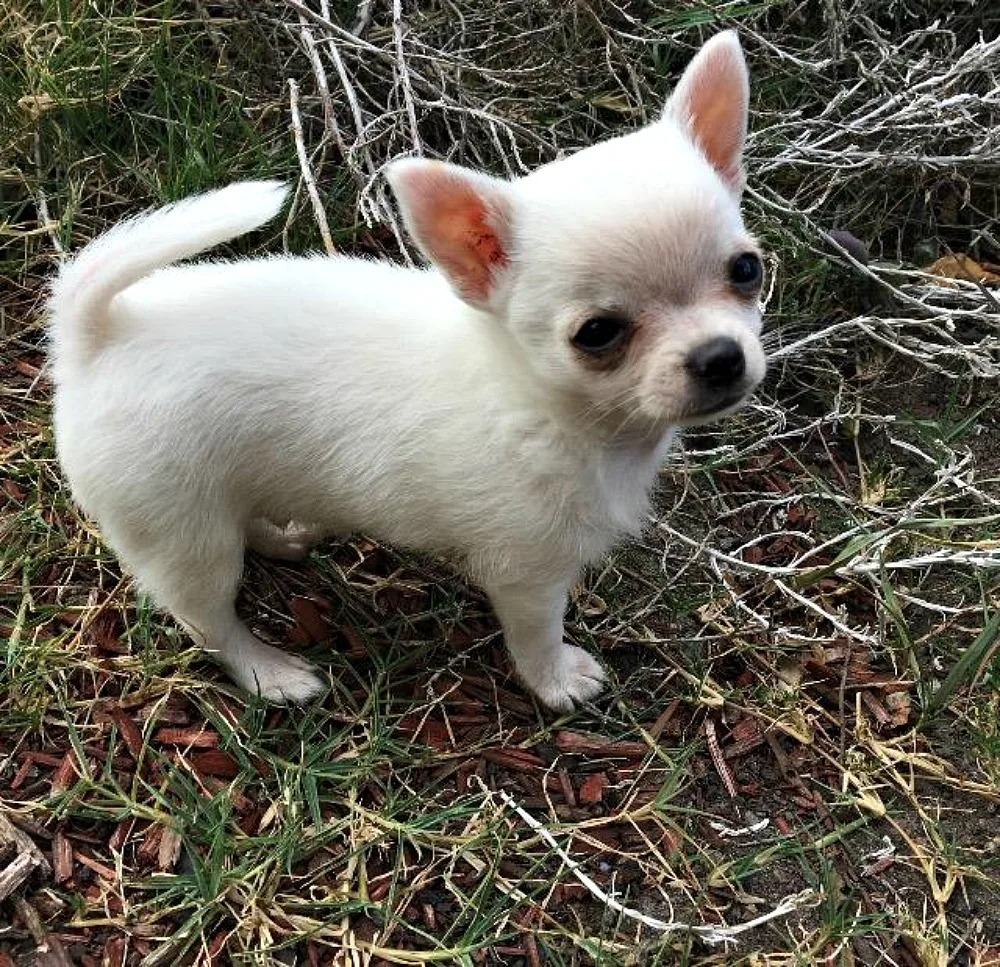Starting off on the right paw is important; use this article to help do just that.

How To Bring Your Puppy Home
When you have a date to pick up your puppy, it’s best to plan the trip. Here are some recommendations:
Local Pick Ups
When your puppy is local to you, it is best to pick up your puppy in a car. Here are some planning points to consider:
Buy all your needed supplies before picking up your puppy. A puppy’s first day home is already very busy for them; the puppy meets their new family, travels home, and explores their new home.
Going to a store where people will want to pet them and with lots of sights and smells will likely be overwhelming. If you discover that you forgot something, try to use curbside pick up if you have to pick it up with your puppy on the way home, or drop off the puppy and passenger at home, then go back out to the store. For example, Petsmart and Target offer curbside pick-up within hours for free.
Plan to have a driver and one other passenger; that way the puppy has someone to hold and comfort them and the driver is not distracted. Avoid the car being full of loud people as it may overwhelm your puppy. Any extra passengers must be calm and quiet.
If you have to make the trip alone; use a dog carrier that you can strap in the passenger side and have the opening facing you so your puppy can see you. Be sure to keep a soft blanket in the carrier for your puppy to lay one
Bring a chew toy, a thick blanket, and a lightweight blanket. The passenger should fold the thick blanket to put in their lap to make a place for the puppy to be comfortable, and to protect their lap from an accident of urine or car sickness.
The lightweight blanket should be kept handy to keep the puppy warm if needed, or as a backup in case of an accident.
Have the chew toy ready so that if the puppy starts chewing on your hands or clothes, you may offer him or her something appropriate.
Before leaving to pick up your puppy, ensure that you have a full tank of gas and everything else that you think you may need with you to reduce the puppy’s time in the car and trips out of the car.
Before leaving with your puppy, encourage him or her to go potty before you get in the car to reduce stops on the way home which reduces the chances of the puppy escaping outside.
If the trip home is more than an hour or two; then have a small bowl and bottle of water so you can give your puppy a drink. And plan to make a potty stop.
If you get hungry, use a drive-thru restaurant instead of parking and getting out for food. A puppy who is not used to the car may be anxious, so keeping the ride low-key and consistent without lots of stops is best.
If you stop at a gas station, be sure to have your passenger securely holding your puppy before opening the doors of the car, and do not let your puppy out of the car off-leash. Be sure that your puppy’s harness fits securely before walking your puppy at a gas station. Try to take a potty break in a quieter area to avoid the puppy bolting out of fear and with both the driver and passenger present to capture the puppy quickly if necessary.
Long Distance Pick Ups
If your puppy is further away from your home than could be managed in a day trip:
- Renting an RV to pick him or her up instead of driving in a car or using an airplane will probably be more comfortable for you and your puppy.
- If you cannot make the trip, consider hiring a trusted person to make the trip to pick up your puppy.
- If your puppy will be shipped in an airplane, carefully research the airline’s protocols for dogs to ensure that they will be treated humanely during transport. If anything you discover makes you uncomfortable, search for other options.

Before You Bring Your Puppy Home
- As stated earlier, have all the supplies you will need for your puppy already for them at home.
- If possible, a week or so before you pick up your puppy, give a T-shirt that you have just worn, and that hasn’t been washed to your puppy to sleep with so he or she gets used to your smell.
- Decide where they are going to sleep. For me personally, I had a little playpen that I kept in the family room where my puppies slept until I was reasonably sure they were not going to pee on my bed. Then I allowed them to sleep on my bed with the rest of the dogs (here’s a post that will help you decide if you should let your dog sleep with you).
- I also bought a stuffed dog that had a removable heating pad that you warm in the microwave and also has a heartbeat. This helps puppies to not feel alone. You can buy it here.
- Decide what veterinarian you will use and make an appointment for a checkup for several days after the puppy is home. If you don’t know who to use, ask friends for recommendations. Or if your breeder is local, ask them who they recommend. You can also ask on a local forum like Nextdoor.com for recommendations.
- Find out what the breeder is feeding your puppy and plan on feeding them that, at least at first. If you want to feed them something else, you can gradually switch to it over a few weeks. Whether you plan on switching or not, buy some of the same food that they have been eating to get them started.
Where To Start When You Bring Your Puppy Home
I also recommend planning their first day home. When your puppy arrives home, here is what a good first day looks like:
- When the puppy arrives, encourage him or her to go potty before going in the house.
- Walk the puppy around the perimeter of their yard on a leash, then around the house on a leash to explore every room. Finish the tour where his or her water bowl is and remove the leash and harness.
- Make the people your puppy meets just their new family the first day home. Everyone should sit on the floor with a toy, and allow the puppy to initiate their interaction. If the puppy begins acting overwhelmed, the people they are meeting should give them space.
- Make a schedule and follow it from whenever your puppy comes home. For example, offer breakfast, dinner, snuggles, walks, bedtime, and playtime around the same times daily.
What To Expect When You Bring Your Puppy Home
While you are crazy excited to bring your puppy home, he or she does not understand what is happening like you do. Keep the following in mind:
- Your puppy will be adjusting to the new normal in your home. Have patience with him or her.
- If this is your first puppy, know that even the most seasoned pet parents will experience some bumps along the road. Similar to raising a child, raising a puppy is not a tidy experience, but it is amazingly beautiful and totally worth it.
- Following a similar daily routine will help your puppy adjust. Though every day cannot be the same, pick a routine that you can reasonably follow closely on a daily basis.
- Before I went to bed, I would take them out to potty one last time, make sure they had water, and food available in their playpen, and then take off my shirt inside out and lay it in their dog bed so they could smell me.
- Expect to have a few sleepless nights. Your puppy will most likely cry because they are scared, lonely, or bored. It’s a good idea to get up at least once during the night and take them out to potty. They have tiny bladders and can’t hold it in when they are very young. Also, take them out again as soon as you get up in the morning.
- You and your family will also be adjusting to having a new member in the home. Do what you can to make the transition smooth based on what works for your family.
- Bonding takes time and intentional actions. Take every opportunity you can to bond with your puppy. Bonding opportunities happen from taking care of your puppy every day; snuggling, bathing, feeding, walking, training, and playing. Spend as much time with your puppy as you can to build a strong bond.
- Your puppy will bark, chew on inappropriate items, and have accidents as they learn the ropes. This is part of the learning and adjustment process and it does not mean that it will happen forever. Just patiently work with your puppy to get to where you want to be. Consider taking a training class no matter how things are going. If needed, hiring a trainer to come to your house to help you work with your puppy can save you from frustration.
- Your puppy will make friends wherever they go! When you and your puppy go places people will probably comment on how cute she or he is and want to pet them.
- With time and effort, you can build a strong and awesome relationship with your puppy, and end up with a well-trained dog to share your life with. Do things right the first time to get there efficiently.
General Tips For Your Puppy’s First Day At Home
Here are some general tips for your puppy’s first day at home:
- You may have lots of people who are excited to meet your puppy. Be sure to spread out the visits out over a week or two and have everyone remain calm, sitting on the floor to get closer to the puppy’s level and prevent dropping a wiggly puppy, allowing the puppy to initiate the interactions.
- As you take your puppy places, there will be people who will want to pet him or her. Take opportunities to socialize, but be cognizant if they are appropriate, positive opportunities or potentially negative ones. If you do not think that it would be a positive experience for your puppy pass on it, as a negative experience can impact your puppy for the rest of his or her life.
- If you get frustrated, it is best to step away for a few minutes to calm down. NEVER hit, kick, or physically injure your puppy out of frustration, in an attempt to train him or her, or for any other reason.
- It is important to keep your puppy up to date on all of his or her vaccines (do space vaccines out and only have them get one vaccine at a time with a few weeks in between as tiny dogs can have bad reactions to being over-vaccinated) and that he or she receives regular veterinary care to keep them healthy and reduce the potential to spread diseases.
- If you want your puppy to be well trained, start training from the first few days he or she is home.
- Do not allow bad habits to form; allowing a puppy to do something a few times may make them think it is acceptable and continue that behavior.
- Be patient and consistent with potty training. Keep in mind that puppies are not maliciously peeing or pooping in the house; they are learning what behaviors are acceptable and how to communicate with you. Some puppies have accidents out of fear, so if you consistently notice an accident, for example after a loud sound, consider that your puppy may have been frightened. This post will give you more help on potty training your puppy.
- If you decide that your puppy is not a good match for you and your family, finding a home that is a better match may be the right choice for everyone involved. All puppies and dogs deserve homes where they receive the unconditional love that they give so freely, and living with frustrated parents takes a toll. Be sure to either choose someone you know well or thoroughly research any potential new homes and never give your puppy away via “free to good home”. Especially avoid craigslist. Do give it more than one day before deciding your puppy isn’t a good fit. It takes a while for both you and the pup to adjust to each other.

Tips For Solving Common Puppy Problems
Here are some common puppy problems and potential solutions to them:
Biting.
Most puppies are very mouthy because they are teething and learning how to play appropriately. This means that many puppies bite other dogs, or people, playing with them.
Most dog-savvy people understand this, but people who are not used to dogs may not. As such, be sure to warn people who may not be used to puppies that he or she is mouthy.
When a puppy bites, firmly say, “NO, BAD”, then depending on your puppy’s temperament, either stop interacting with your puppy until he or she calms down, or offer your puppy a chew toy and say, “chew on this!” in a positive tone, praising them more when they do.
This post will give you more information on how to stop your dog from biting.
Parasites.
Some puppies will come home with a parasite that they picked up. As such, arrange for a veterinary examination within the first few days of having your puppy. You will need a stool sample for your veterinarian to test. You can reduce the likelihood of your puppy picking up parasites by:
- Avoiding dog parks.
- Arranging for regular preventative veterinary care for your puppy.
- Use monthly flea and tick preventatives recommended by your veterinarian.
- Picking up after your puppy when he or she poops.
- Only offering fresh water to your puppy and not allowing him or her to drink out of puddles, ponds or streams.
- Not allowing your puppy to eat rodents or dead animals he or she encounters.
Accidents in the house.
The best way to prevent accidents is to be vigilant. To start potty training on the right paw, offer the puppy a potty break every hour that your puppy is awake for the first few weeks. Be sure to say “let’s go potty” and make a big deal when he or she does potty outside by offering lots of praise and treats.
Pay attention to your puppy’s potty cues to learn how he or she will communicate that they need to go. Especially after your puppy eats dinner or drinks a lot of water, be alert to prevent accidents.
When your puppy has a poop accident in the house, take the poop outside and place it where you want him or her to go potty so that the smell will be there. This may assist with house training. Also, consider installing a scented stake where you want your puppy to go, as this may help encourage him or her to go there.
Escaping outside.
If your puppy has run loose outside, you know how scary it is to not be able to find him or her. While accidents like open doors do happen, in general, this is a pretty simple scare to prevent by:
- Training your puppy to come when called.
- Always having your puppy on a leash when outside unless in a securely fenced area.
- Posting a sign on your door or gate noticing anyone using it to keep it closed.
Chewing on inappropriate items.
Teething puppies will seek out things to chew on that soothe their discomfort. It’s hard to predict what textures your puppy will prefer, and the more appropriate chew toys they have, the less likely they are to chew on inappropriate items.
So at first, purchase all puppy chew toys that you think look good, then as you get to know your puppy, choose the types of toys he or she gravitates toward.
Anytime your puppy is chewing on something inappropriate, take away that item and firmly say, “NO, BAD”. Then offer your puppy an appropriate toy and praise him or her when she takes it by saying in a happy voice, “Good, take your toy!”.
Of course, anything that you do not want to be chewed on, or that is a potential choking or intestinal blockage hazard, should be kept out of your puppy’s reach. You cannot reasonably be angry at a puppy for chewing on something that they innocently come across.

Conclusion
Bringing home a new puppy is an exciting time. Although caring for a puppy is a major responsibility, it is a labor of love and simple once you get the hang of it. Puppies do best with calm and consistent routines. With this guide to help you, I hope that you and your puppy achieve the start of a beautiful relationship.
Also Read: How to Take Care of Your New Chihuahua Puppy


Marguerite
Sunday 26th of December 2021
After I lost 8-Ball I began searching for another dog. I looked on-line every day and it seemed only large dogs were up for adoption. After 8 weeks I began to pine away--truly. Then one Thursday night I found a 2-year old, long-haired Chihuahua up for adoption at the animal shelter. Fortunately, the shelter was open late and I immediately called and set up an appointment to meet Bella after work the following day. Bella's family gave her up as they could "no longer care for her". I knew immediately upon meeting Bella she was the dog for me. Friends drove us home. Bella fell asleep in my arms on the trip. The first thing I did was give her a bath because she smelled of pee. When it was time to go to sleep, I'd put a dog bed on the floor for her. But I was in bed and I lifted up the covers and Bella jumped up on the bed and has been sleeping with me for 11 years.
Cathy
Sunday 26th of December 2021
I'm so glad you rescued her Marguerite! Thanks for sharing your story.
Dixie
Saturday 25th of December 2021
Love these sweet chi babies. Want all of them, especially the little guy with a Monday frown, lol......MERRY CHRISTMAS TO ALL CHI PARENTS.
Cathy
Sunday 26th of December 2021
Merry Christmas Dixie! Hope it was a good one!